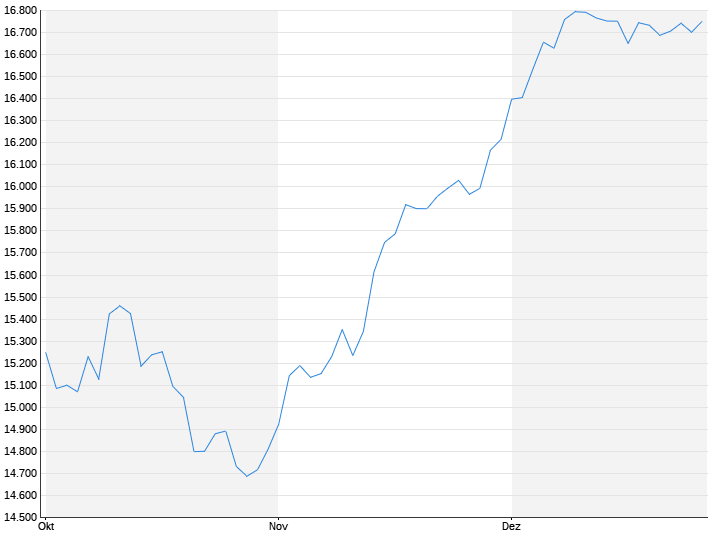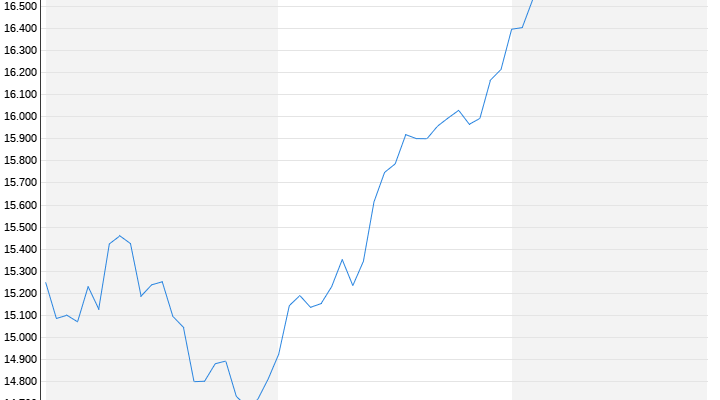2023 was an excellent year for investors – despite all external disruptive factors such as the Ukraine and Middle East wars. The DAX jumps up a good 20 percent. Is the air getting thinner or will the rally go into the next round and will the 20,000 mark be broken?
After the very mixed stock market year of 2022, 2023 is off to a promising start. But as early as spring, the good mood threatens to change, prices collapse and memories of the financial crisis almost 15 years ago are awakened: the US banking landscape is simmering, and several regional financial institutions are in trouble. The US Federal Reserve (Fed) has to intervene, and it does – and calms the nervous markets. In the summer, the first glimmer of hope regarding a turnaround in interest rates will appear around the corner, allowing investors to fantasize about the first interest rate cuts as the year progresses. At the end of the 2023 stock market year, the DAX and S&P 500 each have around 20 percent profit in their trading books.

“The trust in the Fed is enormous, true to the motto: The Fed will sort it out,” says financial market expert Benjamin Feingold from Feingold Research, looking back and looking forward: “So far it looks as if the US Federal Reserve has done everything right ” he says, referring to the Fed’s interest rate policy. “If it stays that way, we should be looking at a positive stock market year in 2024.”
The managing director of Fiduka portfolio management, Marco Herrmann, also shares this opinion: “After the sell-off in 2022, the Fed’s interest rate policy also ensured that the past year was a balm for investors’ wounds,” he explains. “It went better than we thought. But we also believe that it’s not over yet and that the markets can continue to rise,” he says, optimistically for the stock market year 2024. “We are in a phase where monetary policy is less restrictive and inflation comes back a little: That’s a good combination,” emphasizes Herrmann. But he restricts: “There must be economic growth.”
“That’s the crux of the matter in my eyes,” says Carsten Riehemann, managing partner of the asset management company Albrecht, Kitta & Co.: “If the US economy slips into a recession, there will be problems. But we absolutely don’t expect that to happen.” , he points out. “Moderate growth in the world’s largest economy should be sufficient for a fundamentally positive environment for stocks.”
Possible disruptive factors already in sight
However, Riehemann admits that external disruptive factors could also cause “at least short-term fluctuations” in 2024. He refers to the elections in Taiwan coming up in January and the US presidential election at the end of the year. Herrmann and Feingold also advise investors to keep an eye on these two political events: “We have a great election year ahead of us,” said Herrmann. “Depending on the outcome of the election in Taiwan, China’s government may feel compelled to take political, economic, perhaps even military steps – although the latter is very unlikely.”
“The real big unknown is the US presidential election in November,” says stock market expert Feingold. “Incumbent Joe Biden’s popularity ratings are in the basement. There are currently some indications that Donald Trump will be the Republican challenger. According to surveys, his chances of being elected US President are currently good,” he explains. “Looking back, investors at least couldn’t complain about President Trump. Geopolitically, things look different: America First, trade disputes with Europe and China. A lot of china was broken,” Feingold explains: “Trump is the great unknown.”
According to Fiduka managing director Herrmann, caution is also advised when it comes to the wars in Ukraine and the Middle East: “In the Middle East, the crisis can spread to other countries, which in turn could put a strain on oil and gas production and affect the global economy.” In addition, the war in Ukraine has stalled, “which could certainly offer potential for escalation.”
Persistent issues of inflation and interest rates
None of the three experts see much potential for escalation when it comes to the long-running issues of interest and inflation. “Inflation will remain an issue in 2024, but in a much weaker form,” says depot manager Herrmann. “We assume that euro inflation will range between two and four percent. But that will take place over the course of years and probably in the upper third of the range.” Riehemann speaks of a “high two or low three” in the euro zone. In the USA he sees the inflation rate “tends to be around the two percent mark”.
According to experts, there will be several interest rate cuts in the USA in 2024. “The market is currently expecting three to four,” said Feingold. “That suggests an initial reduction in spring. However, if this does not happen, there is potential for disappointment,” he explains. “Investors should above all keep an eye on the interest rate policy of the central banks in 2024 – and they should diversify,” says Albrecht, Kitta & Co. partner Riehemann.
How much is there now?
“Technology as a whole remains interesting, in all possible forms,” explains Riehemann. “The Magnificent Seven play a big role simply because of their high weighting,” he says, referring to Alphabet, Amazon, Apple, Meta, Microsoft, Nvidia and Tesla. “Whenever an index purchase takes place on the S&P 500 or the MSCI World, these stocks benefit disproportionately compared to other stocks. As a result, their valuations continue to climb.”
“Semiconductors are needed almost everywhere, which is why investors are likely to focus on chip values in 2024,” says Fiduka managing director Herrmann and speaks of a “super cycle” in the chip sector. “Infineon could boost the DAX. In addition, classic growth stocks could come back into focus again.”
In addition to the semiconductor sector, the area surrounding artificial intelligence (AI) applications will also remain in demand, as stock market expert Feingold explains. “There is also a need to catch up, especially in the healthcare sector. Small caps and cyclicals could also be in demand in 2024,” says Feingold. “In general, market profits will increase across the board.” He believes that “eight to ten percent” growth is possible for the DAX and is therefore on the same wave level as Herrmann. But both experts also say that “clear predictions are difficult.” Who knows, maybe the 20,000 mark will fall in the DAX in 2024?
